Amazon Dominance 'Wouldn't Be Better for Writers. Or Readers'
 "I know it would be better for Amazon if publishers and competing booksellers went away. It just wouldn't be better for writers. Or readers."
"I know it would be better for Amazon if publishers and competing booksellers went away. It just wouldn't be better for writers. Or readers."
 "I know it would be better for Amazon if publishers and competing booksellers went away. It just wouldn't be better for writers. Or readers."
"I know it would be better for Amazon if publishers and competing booksellers went away. It just wouldn't be better for writers. Or readers."
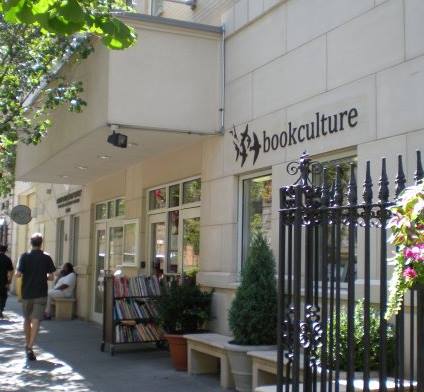 Employees at New York City's Book Culture finalized a three-year contract Wednesday that includes higher wages, fixed raises and affordable health care, the Daily News reported. Earlier this year, they had been caught up in a showdown with management over attempts to unionize. The workers are represented by the Retail Wholesale and Department Store Union. Book Culture currently operates two locations on the Upper West Side, with a third store planned for 82nd and Columbus.
Employees at New York City's Book Culture finalized a three-year contract Wednesday that includes higher wages, fixed raises and affordable health care, the Daily News reported. Earlier this year, they had been caught up in a showdown with management over attempts to unionize. The workers are represented by the Retail Wholesale and Department Store Union. Book Culture currently operates two locations on the Upper West Side, with a third store planned for 82nd and Columbus.
"Now everyone is super happy,” said Cameron Addicott, one of five staff members fired in July for casting ballots in a union election, four of whom were rehired in July. "We're able to get back to what we do best. There isn't any worry in the work place. There's that knowledge that you have that support."
Under the contract, the hourly wage is raised from $9.50 to $10.25 after a 60-day probationary period, followed by a 50-cent annual raise, the Daily News wrote, adding that "workers who log more than 22 hours per week are eligible for the union's health care coverage, which saves workers $100." Most employees also qualify for two weeks paid vacation (three weeks for those with more than four years of service), bonus pay on the holidays and six to eight paid sick and/or personal days.
Owner Chris Doeblin said his customers wanted to shop at a unionized store and supported the agreement.
Union president Stuart Appelbaum commented: "The new contract sends the message to all retail workers in New York that you can obtain better wages and a fair schedule when you stick together with the union."
 The Publishers Association is calling for a competition inquiry into Amazon's dominance, saying that the U.K.'s retail book market "suffers from a chronic and debilitating imbalance for authors, publishers and booksellers." The Financial Times reported that the "call for the government to set up an independent inquiry is designed to avoid allegations that publishers are acting anti-competitively."
The Publishers Association is calling for a competition inquiry into Amazon's dominance, saying that the U.K.'s retail book market "suffers from a chronic and debilitating imbalance for authors, publishers and booksellers." The Financial Times reported that the "call for the government to set up an independent inquiry is designed to avoid allegations that publishers are acting anti-competitively."
"We can see what's going on with disputes in the U.S. and Germany," said PA CEO Richard Mollet, adding that an inquiry by the Competition and Markets Authority would provide "independent, forensic analysis" of Amazon's behavior. "This is a genuine appeal for information. It would be disappointing if this were interpreted as an act of aggression."
Noting "routes to market for e-books are too narrow and too few," the PA added that "the online market for print books is similarly restricted... ultimately restricting consumers' choice of retail opportunities."
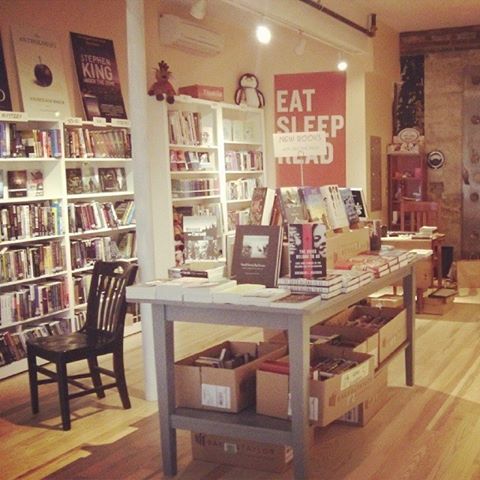 Riverrun Bookstore will close its Kittery, Maine, location, which opened last year, October 1. In an e-mail announcing the decision, Riverrun said its flagship store in nearby Portsmouth, N.H., "is NOT closing, it is alive and well."
Riverrun Bookstore will close its Kittery, Maine, location, which opened last year, October 1. In an e-mail announcing the decision, Riverrun said its flagship store in nearby Portsmouth, N.H., "is NOT closing, it is alive and well."
Expressing gratitude to "customers who supported RiverRun in Kittery Foreside," the bookseller noted: "We loved, loved, loved being there, but unfortunately our sales at that location have not come close to the level needed to sustain our expenses. Nothing ventured, nothing gained as they say, and we are happy we took the risk. We will miss that location greatly."
 The Society of Children's Book Writers and Illustrators has added illustrator Peter Brown; authors Matt de la Peña, Laurie Halse Anderson and Ruta Sepetys; and Laurent Linn, art director at Simon & Schuster Books for Young Readers, to its Board of Advisors.
The Society of Children's Book Writers and Illustrators has added illustrator Peter Brown; authors Matt de la Peña, Laurie Halse Anderson and Ruta Sepetys; and Laurent Linn, art director at Simon & Schuster Books for Young Readers, to its Board of Advisors.
"Our Board represents a diverse cross section of leading lights in our industry," said SCBWI executive director Lin Oliver. "They play a crucial role in guiding the SCBWI forward."
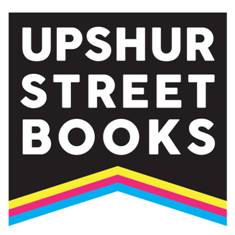 By the end of October, Washington, D.C., will have a new independent bookstore: Upshur Street Books, in the city's Petworth neighborhood, which has had no indie bookstore. The store's owner and founder is Paul Ruppert, a local entrepreneur who is also the backer of Petworth Citizen, a bar and reading room; Crane & Turtle, a restaurant; and the Warehouse Theatre, a multi-purpose arts complex for theater, music, film and visual arts.
By the end of October, Washington, D.C., will have a new independent bookstore: Upshur Street Books, in the city's Petworth neighborhood, which has had no indie bookstore. The store's owner and founder is Paul Ruppert, a local entrepreneur who is also the backer of Petworth Citizen, a bar and reading room; Crane & Turtle, a restaurant; and the Warehouse Theatre, a multi-purpose arts complex for theater, music, film and visual arts.
"I've always loved bookstores, but I don't have any experience as a bookseller," said Ruppert. After the spot next to Petworth Citizen opened up, and encouraged by reports of the indie bookstore resurgence, he decided to open one of his own. "The kind of key to our success is that we find really talented people who are knowledgeable and passionate and hardworking and set up a framework."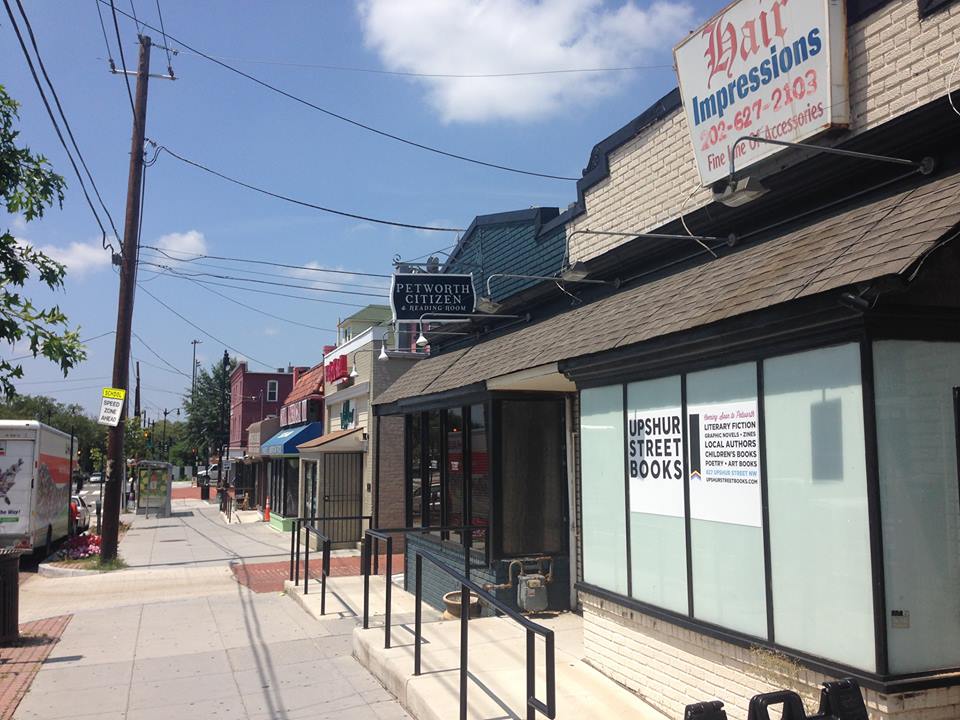 To that end, Ruppert has hired Anna Thorn, currently programs manager at Politics & Prose, to manage the new store. Thorn has worked at P&P for just over four years, beginning as a frontline bookseller before eventually moving on to projects manager. In that role she oversaw the store's expanding offerings of classes, trips and tours. The job required, Thorn said, innovative programming and frequent evaluations of customer feedback--two things which she plans to bring to Upshur Street Books.
To that end, Ruppert has hired Anna Thorn, currently programs manager at Politics & Prose, to manage the new store. Thorn has worked at P&P for just over four years, beginning as a frontline bookseller before eventually moving on to projects manager. In that role she oversaw the store's expanding offerings of classes, trips and tours. The job required, Thorn said, innovative programming and frequent evaluations of customer feedback--two things which she plans to bring to Upshur Street Books.
"The idea is to figure out what the community wants," said Thorn. She looks to differentiate the 800-square-foot store from other area indies with a wide-ranging but careful selection. In addition to bestsellers and trade fiction and nonfiction, Thorn intends to specialize in four sections: children's books, art books, literature and poetry, and local authors. Sidelines, meanwhile, will include cards, gifts, and art made by local artists. And all of these sections, Thorn added, will be adjusted based on customer feedback and sales data.
"As I was going through the catalogues and getting a purchase order together, I felt like a kid in a candy store," Thorn recalled. She described herself as a diverse, omnivorous reader and hopes to hire employees with similarly wide-ranging interests. Although she described her own taste in fiction as a bit "out there," she has reason to believe that it will suit her community just fine: at an open house held recently to meet community members and gather support for a successfully funded Kickstarter campaign (asking for $17,000 towards construction costs), Thorn set up a poster asking for people to write down their favorite books and authors.
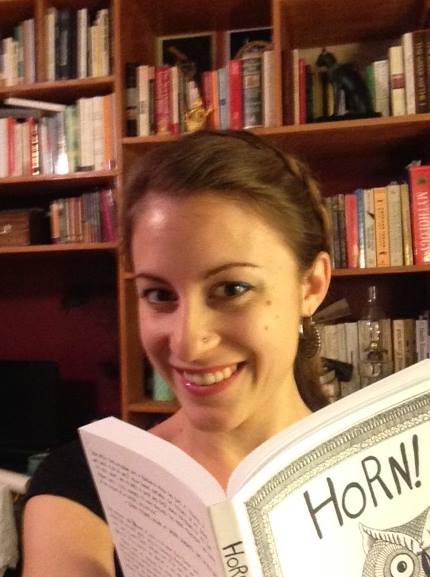 |
|
| Anna Thorn, Upshur's manager. | |
"I was so excited," she said. "There were so many great, weird, intelligent answers. Even though I have strange tastes, they might be exactly what my customers are looking for."
Events will be another one of the store's focal points, and Thorn said that she's "willing to try anything." Beyond hosting the traditional author event and supporting book clubs and groups, Thorn would like to host language groups and conversation classes. Children's programming, including story hours and singalongs, will be big. Both Ruppert and Thorn described the Petworth community as very creative and very artistic, and to suit those needs she'll organize craft workshops and art-oriented events. Given the store's small amount of space, Thorn will occasionally host events in Petworth Citizen's reading room next door.
Thorn heard about the plan to open an independent bookstore in Petworth before she was aware of the job opportunity, and was initially thrilled just to know that an indie would soon open in her neighborhood. At the beginning of this summer, a job posting was put up for store manager. Before Thorn even began seriously thinking about applying for the job, the posting was taken down and she assumed the position had been filled. But then it reappeared toward the end of summer, and this time Thorn seriously considered it.
"I applied, and things moved very quickly," Thorn said. "I met Paul and the whole management team and they made me feel good about being involved. They were easy to work with, very competent, and they did their homework."
According to both Ruppert and Thorn, the Petworth community's response has been very encouraging. More than 100 people showed up to the open house, and more than 300 backed the store's Kickstarter campaign. Said Ruppert: "We've seen great responses and enthusiasm from a wide range of people." --Alex Mutter
Paul Sidey, former editorial director at Hutchinson--an imprint in the Cornerstone Publishing division of Random House Group U.K.--before retiring in 2012, has died, the Bookseller reported. "We are extremely saddened to hear of the passing of Paul," said Cornerstone managing director Susan Sandon "He was a brilliant editor and a much loved colleague and he will be greatly missed."
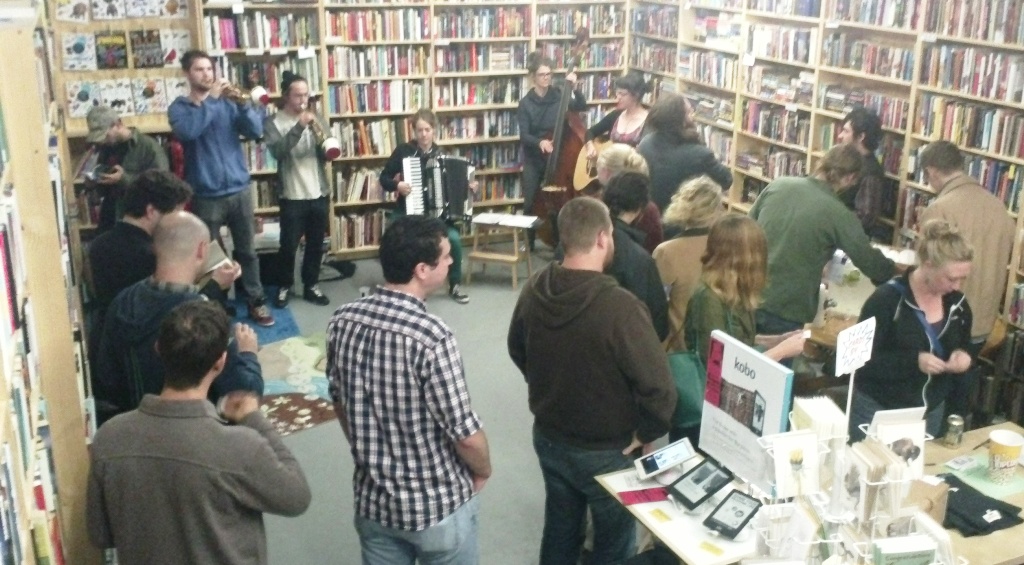 Monday night, Moon Palace Books, Minneapolis, Minn., hosted a midnight release party for Wolf in White Van (FSG), John Darnielle's (lyricist and guitarist of the Mountain Goats) NBA-longlisted debut novel. Attendees enjoyed snacks, performances by local musicians, and a chance to win t-shirts, autographed manuscript pages and "a free night at the St. Paul Hotel resting your head on a pillow case autographed by John Darnielle!"
Monday night, Moon Palace Books, Minneapolis, Minn., hosted a midnight release party for Wolf in White Van (FSG), John Darnielle's (lyricist and guitarist of the Mountain Goats) NBA-longlisted debut novel. Attendees enjoyed snacks, performances by local musicians, and a chance to win t-shirts, autographed manuscript pages and "a free night at the St. Paul Hotel resting your head on a pillow case autographed by John Darnielle!"
This was the last in a series of Lit Up Late events coordinated by Moon Palace Books owner Angela Schwesnedl, David Enyeart from Common Good Books and Ann Mayhew from Magers & Quinn. The previous midnight parties were for Colorless Tsukuru Tazaki and His Years of Pilgrimage by Haruki Murakami and The Bone Clocks by David Mitchell.
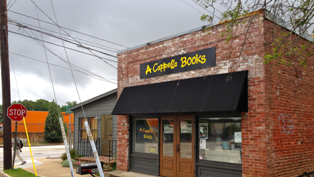 Creative Loafing named A Cappella Books "Best Local Bookstore" in its 2014 Best of Atlanta issue, noting that the bookshop "has been a staple for rare and out-of-print titles, as well as new and used books. Although small, this cozy Inman Park shop boasts a huge array of books ranging from music, architecture, and politics to fiction and poetry. The shop also features a section of signed books; it famously sold a signed copy of Gone With the Wind for $15,000 last year. A Cappella's employees are all book fiends, and the shop's visiting author talks and signings provide lots of chances for shoulder-brushing with famous authors such as Chelsea Handler and David Sedaris."
Creative Loafing named A Cappella Books "Best Local Bookstore" in its 2014 Best of Atlanta issue, noting that the bookshop "has been a staple for rare and out-of-print titles, as well as new and used books. Although small, this cozy Inman Park shop boasts a huge array of books ranging from music, architecture, and politics to fiction and poetry. The shop also features a section of signed books; it famously sold a signed copy of Gone With the Wind for $15,000 last year. A Cappella's employees are all book fiends, and the shop's visiting author talks and signings provide lots of chances for shoulder-brushing with famous authors such as Chelsea Handler and David Sedaris."
This week, Steerforth published the paperback of The Book of Matt: Hidden Truths About the Murder of Matthew Shepard by Stephen Jimenez ($16, 9781586422264). When the controversial book was published in hardcover last year, activists launched a campaign to pressure booksellers to cancel the author's appearances. In a new afterword for the paperback, Jimenez pays homage to all the independent booksellers and others who refused to cancel any of his 37 events, and recounts his experiences at the Tattered Cover, Denver, Colo., and Politics & Prose in Washington, D.C.:
"When I arrived at Tattered Cover on that November evening, Joyce Meskis, the bookstore owner, assured me she was 'ready' if any troublemakers showed up to interfere with the event. A longtime defender of First Amendment rights and former president of the American Booksellers Association, Meskis positioned herself in the back row of the audience, prepared to escort disruptive individuals to the door.... Two weeks earlier when I'd arrived for a book event at Politics and Prose in Washington, D.C., the store's owners, Bradley Graham and Lissa Muscatine, had ushered me into their office for a private meeting. They explained that they'd been getting a steady stream of messages from angry people intent on stopping my book tour. Graham and Muscatine said they never considered caving to the pressure. A short while later, each took to the podium at the back of their store and offered eloquent statements in defense of free speech. They also read a press release they'd received from the American Booksellers Foundation for Free Expression, imploring bookstores not to cancel my events.... I was hosted for thirty-seven book events around the country, and at every one of them I had the privilege of engaging in meaningful conversations."

Today on Fresh Air: James Tobin, author of The Man He Became: How FDR Defied Polio to Win the Presidency (Simon & Schuster, $18, 9780743265164).
---
Sunday on MSNBC News: a 7:30 a.m. Your Business segment about Find Waldo Local, filmed partly at Eight Cousins, Falmouth, Mass., and partly at Octavia Books in New Orleans, La.
Factory Man, a miniseries in development at HBO, is being produced by Tom Hanks and Gary Goetzman's Playtone, Deadline.com reported. The project is based on Beth Macy's nonfiction book Factory Man: How One Furniture Maker Battled Offshoring, Stayed Local--And Helped Save an American Town. Playtone, which was behind Band of Brothers, The Pacific and John Adams, also produced HBO's Olive Kitteridge miniseries.

Adult fiction:
Black River by S.M. Hulse (Houghton Mifflin Harcourt, January 20)
Etta and Otto and Russell and James by Emma Hooper (Simon & Schuster, January 20)
Wolf Winter by Cecilia Ekback (Weinstein Books, January 27)
Young Skins by Colin Barrett (Grove Atlantic, March 3, paperback)
Soil by Jamie Kornegay (Simon & Schuster, March 10)
The Valley by John Renehan (Dutton, March 10)
Church of Marvels by Leslie Parry (Ecco, May 12)
The Travels of Daniel Ascher by Deborah Levy-Bertherat (Other Press, May 26)
Adult nonfiction:
The Upstairs Wife: An Intimate History of Pakistan by Rafia Kakaria (Beacon Press, February 3)
Hammer Head: The Making of a Carpenter by Nina MacLaughlin (Norton, March 16)
YA:
Red Queen by Victoria Aveyard (HarperTeen, February 10)
Mosquitoland by David Arnold, Ken Wright (Viking March 3)
We All Looked Up by Tommy Wallach (Simon & Schuster Books for Young Readers, March 31)
Denton Little's Deathdate by Lance Rubin (Knopf Books for Young Readers, April 14)
An Ember in the Ashes by Sabaa Tahir (Ben Schrank/Razorbill, April 28)
Conviction by Kelly Gilbert (Disney-Hyperion, May 19)
Because You'll Never Meet Me by Leah Thomas (Bloomsbury, June 2)
Middle grade:
The Honest Truth by Dan Gemeinhart (Scholastic Press, January 27)
Murder Is Bad Manners by Robin Stevens (Simon & Schuster Books for Young Readers, April 21)
Unusual Chickens for the Exceptional Poultry Farmer by Kelly Jones (Knopf Books for Young Readers, May 12)
The Writers' Trust of Canada has announced finalists for the $60,000 (about US$54,780) Hilary Weston Writers' Trust Prize for Nonfiction, which honors a work that demonstrates literary excellence and "a distinctive voice, as well as a persuasive and compelling command of tone, narrative, style and technique." The winner will be named October 14. This year's shortlisted titles are:
Shopping for Votes: How Politicians Choose Us and We Choose Them by Susan Delacourt
This Changes Everything: Capitalism vs. the Climate by Naomi Klein
Happy City: Transforming Our Lives Through Urban Design by Charles Montgomery
Extreme Mean: Trolls, Bullies and Predators Online by Paula Todd
Boundless: Tracing Land and Dream in a New Northwest Passage by Kathleen Winter
 |
|
| photo: Wyatt McSpadden | |
Brian Hart was born in Idaho in 1976. He was awarded the Keene Prize in 2006, received an MFA from the Michener Center for Writers in 2008 and is a Dobie Paisano Johnston Fellow for 2014. His first novel, Then Came the Evening, was published in 2010 by Bloomsbury. His second novel, The Bully of Order, was just published by Harper. He lives in Austin, Tex., with his wife and daughter.
On your nightstand now:
The Sixth Extinction by Elizabeth Kolbert, Smith Henderson's Fourth of July Creek, George Oppen's Of Being Numerous and 31 Letters and 13 Dreams by Richard Hugo.
Favorite book when you were a child:
I remember plowing through a yard or so of Tom Swift and the Hardy Boys one summer.
Your top five authors :
Tolstoy, Faulkner, Alistair MacLeod, Twain, Melville.
Book you've faked reading:
Fake reading is like fake sleeping: sometimes you just end up doing it anyway. That said, I probably fake read/fake slept through parts of Cloudsplitter by Russell Banks. I was living in Juneau, Alaska, at the time and was hungover a lot, faking my way through whole segments of my existence. I do remember enjoying the book, though, and I have a great respect for Mr. Banks's work. I'll try it again.
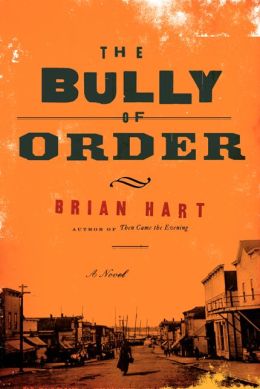
The Dog of the South by Charles Portis. It's genuinely funny, which is rare enough, but it's the line-by-line quality, particularly in the dialogue, that I really admire. He's a writer that people should've been paying attention to for years, but it seems it took the Coen brothers to break the story [with their film adaptation of his novel True Grit]. Sergei Dovlatov is another writer I've been telling people to read, and Halldór Laxness is a third. I'm sure there are dozens more; thankfully, there always seem to be more. Smith Henderson, for example.
Book you've bought for the cover:
I've bought albums and dirty magazines for their covers, but I can't remember buying a book for that reason.
Book that changed your life:
Light in August by William Faulkner. So the ending is a bit of a botch, I don't care. Nobody gets that isolation-tank immersion quite like Faulkner. He has an otherworldly capacity for focus; even when he's swerving into the wrong lane, he stays on the riff, keeps his rhythm.
A writer--living or dead--for whom you'd take a bullet:
I'd take a bullet for Faulkner to save his life and a bullet for (young) Hemingway to piss him off. Actually, I'm sure both of them (again, in their younger days) would've preferred to take their own bullets so that they could write about it later. Who wouldn't? (I'm not really asking, so don't answer.)
Favorite line from a book:
"Get away from me yer stupid chicken." --Michael Ondaatje, The Collected Works of Billy the Kid
Which character you most relate to:
Many years ago, I wanted to be George Washington Hayduke (from Edward Abbey's The Monkey Wrench Gang), mostly because he measured distance in six-packs of beer and got into fights he couldn't win. See below to discover where that got me.
Book you most want to read again for the first time:
I'm probably right around a baker's dozen with concussions, so I get to read a lot of books again for the first time. Right now, I'm rereading Faulkner's Snopes trilogy again for the first time and it's amazing. Make it new, right?
How We Got to Now: Six Innovations That Made the Modern World by Steven Johnson (Riverhead Books, $30 hardcover, 9781594632969, September 30, 2014)
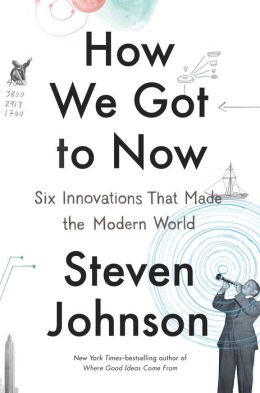
Johnson's treatment of each of his chosen innovations follows a similar pattern: he introduces the subject with an anecdote (as with the discovery of whale oil) or a brief sketch of a character--some obscure (Ellis Chesbrough, who solved Chicago's sanitation problem in the 1850s), others well-known (Galileo, Edison)--and then traces how "an innovation, or cluster of innovations, in one field ends up triggering changes that seem to belong to a different domain altogether." Though in part this is a history of ideas, it's much more the story of the collaborative process, one that's often unintentional and diffuse.
In the case of glass, for example, Johnson persuasively links the work of a small community of 13th-century glassmakers near Venice to the powerful optical telescopes on the summit of Hawaii's Mauna Kea volcano that allow a view of distant galaxies. From early function as "trinkets and empty vessels," he writes, glass has become a "time machine."
The story of cold is equally intriguing. Beginning with Frederic Tudor's quixotic efforts to transport ice to tropical locales early in the 19th century, he describes how Clarence Birdseye used insights he gained while living with his family in Labrador in 1912 to create the modern frozen-food industry. Johnson is interested in much more than the convenience and comfort that flow from these discoveries. Citing techniques that allow the preservation of human semen, eggs and embryos or the changes in population-growth patterns brought about by mass commercial air conditioning, he argues for what he calls a "long zoom" view of history encompassing the "epic scope" of technological change.
Though Johnson describes himself as "resolutely agnostic" on whether all the changes wrought by these chains of innovation ultimately have been for the better, this is a fundamentally optimistic book, if only in the way it pays tribute to our creativity as a species. And when you put on your eyeglasses to read it with a glass of clean, icy drinking water in your hand, you'll be less likely to view these and other features of modern life as commonplace instead of the marvels they are. --Harvey Freedenberg, attorney and freelance reviewer
Shelf Talker: Steven Johnson explores how six chains of innovation have profoundly reshaped our world.
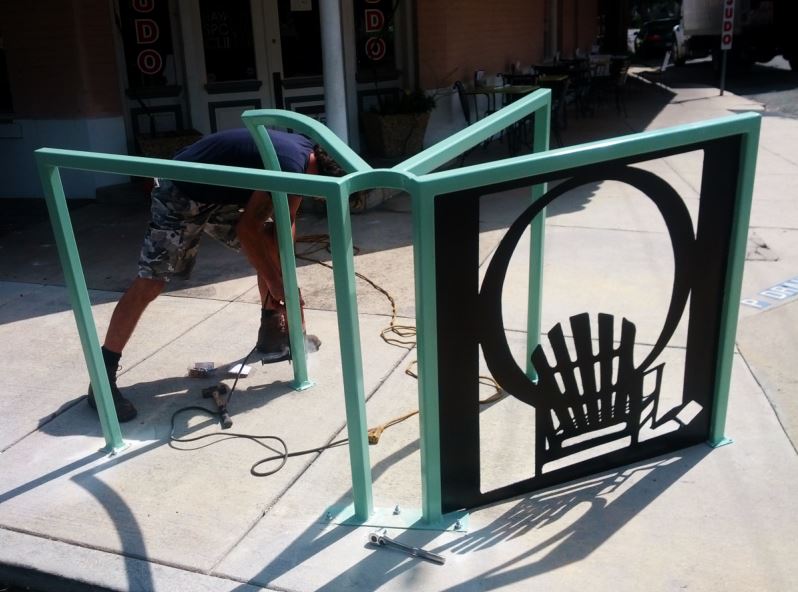
Lowenburg also told me that New Orleans geographer Richard Campanella, who "has always ridden his bike to the book launches we've hosted for him at Octavia Books," had posted an early positive review for the bike rack on Twitter: "I love it. For the first time, the mundane act of locking up a bike will become playful and engaging--very, very well done."
So I asked the question I always ask when something in the book business intrigues me: What's the backstory?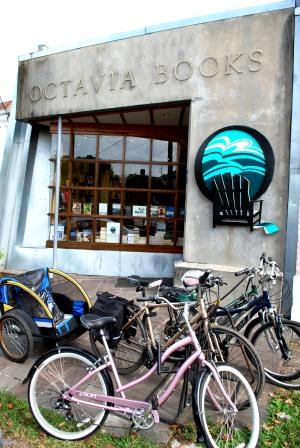 "When we opened Octavia Books almost exactly 14 years ago, my mother--a passionate bike rider into her 70s--gave us a bike rack as a housewarming present," he replied. "It lasted in good shape a few years until a customer backed her car into it one day. And then it held on in not so good shape until we finally had to take it down."
"When we opened Octavia Books almost exactly 14 years ago, my mother--a passionate bike rider into her 70s--gave us a bike rack as a housewarming present," he replied. "It lasted in good shape a few years until a customer backed her car into it one day. And then it held on in not so good shape until we finally had to take it down."
The inspiration for creating a new "fun bike rack" had occurred to Lowenburg and his wife/co-owner Judith Lafitte "as far back as when we stayed at 'Hotel ABA' in Brooklyn, where we saw a couple of examples right in front of the hotel in the form of brightly colored mounted bikers with long-flowing hair. I started researching bike racks and collecting images, but none were exactly right. Online, I found a commercially available rack in the shape of a book--but it was very two-dimensional and not interesting. So, I called on my local ironworks guy."
The original plan was to craft a 3-D book icon with words on the cover, but Lowenburg said "my iron guy had a backlog of jobs and months became years. Finally he turned me over to Scot Evert, who enjoys the challenge of building unique projects. I settled on the idea of angling the book and adding pages to accommodate more bikes. We decided that the cover should be our logo, and Scot said he could cut it out of a sheet of steel by hand."
On Facebook, Evert noted: "I don't normally do this kind of stuff, but sometimes I do...because I actually ride my bike to this book store!"
Lowenburg added: "Working in his back yard, he did a great job of sculpting the frame out of square tubing; and added special touches such as the curved page. The finished rack, painted our store colors, now proudly sits on the corner of Octavia and Laurel Streets in front of our building, which has housed independent businesses for well over a century."
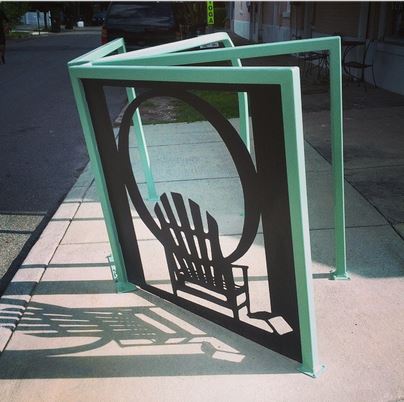 |
|
| photo: James Wilson | |
James Wilson, a bookseller at Octavia for the past six years, is also president of the board of directors for bicycle advocacy group Bike Easy. "With our brand new unique and very stylish bicycle rack, I'm very excited to be able to provide bike parking for our customers," he observed. "Bicycling magazine just came out with their ranking of the most bicycle friendly cities in America, and New Orleans is now ranked 22 (in 2012 we were ranked 43). Lots more people are biking, and there is a huge demand for bicycle parking all over the city. I'd say we have several customers a day who ride their bike to the store."
A handseller at heart, Wilson noted that Octavia features "the best selection of books on bicycling in New Orleans. Tom always asks my advice and I'm constantly scouring catalogues and the Internet for the newest and best titles, whether it be Grant Petersen's Just Ride (a personal favorite), Velominati's The Rules or the excellent Life Is a Wheel by Bruce Weber. Or even a classic bicycle maintenance book like Chainbreaker Bike Book, written by local bike mechanics Shelly Jackson and Ethan Clark. I'm happy to talk to anyone about bikes and books."
Octavia also offers New Orleans Bicycling Maps created by Bike Easy, as well as "information about great weekly rides hosted by NOLA Social Ride," he said. "And yes, I ride my bike to work every day, rain or shine--but it's easy, I only live two miles from the store. I'd like to think Octavia Books is helping New Orleans become even a more bicycle friendly city."
Lowenburg agreed: "A bike rack is an essential feature for an urban, neighborhood-based bookstore like Octavia Books and it is a welcoming beacon to all who come our way." --Robert Gray, contributing editor (column archives available at Fresh Eyes Now)